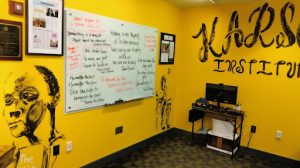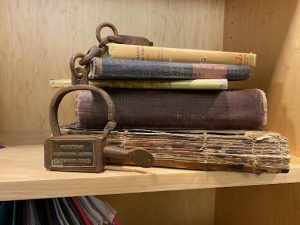The Karson Institute for Race, Peace, and Social Justice celebrated the dedication of its new physical location in the Loyola Notre Dame Library on Monday, Oct. 9.
At the event, guests were greeted with a live jazz performance and an activity labeled “Community Art”, where two canvases were displayed alongside paint supplies, for any attendee to walk up and add to.

The opening celebration began with a series of poems delivered by three college juniors of African American descent. They delivered impassioned declarations on the hardships faced by people of color daily in America, followed by a prayer led by Reverend Timothy Brown. After that, President Terrence Sawyer, Baltimore City Council member Mark Conway, Co-Host Cheryl Moore-Thomas, and the founder of the Karson Institute, Dr. Karsonya Wise Whitehead, shared some words.
Defined by its mission statement of “Bending towards Social Justice,” The Karson Institute started in 2020 as a virtual space dedicated to research and discussion on social justice. Dr. Whitehead said the permanent space in the library will be used for open discussions on issues faced by minorities, including systematic inequality. While Loyola is a university that prides itself on upholding values of tolerance and inclusion, this is the first time a space like this has existed on campus grounds.
“It’s a testament to how far Loyola has come. While there is still a long way to go, we are on the road,” said Dr. Whitehead.
Now that a new physical space has been opened, there are more opportunities for personal, one-on-one debate.

“We want to be able to bring those spaces together, we are committed to doing events twice a month… We will be launching a stone soup series. And inviting people to join us whether we are inviting the students, inviting the community, we are making space for both,” said Dr. Whitehead.
Dr. Whitehead has been a professor at Loyola since 2009. She said she has always had the dream of honoring her family, heritage, and community in her work. That is reflected in the name Karson, her father’s name.
“I think it was really important three years ago, I would never have thought that the Karson would go from being an important part of the conversion to being a vital part of the conversion… banning culture, banning history… you are setting people up to be forgotten,” she said.
Black history is woven, placed, and painted on the walls, encouraging students who enter to have deep conversations about race and color and highlighting several interesting pieces that display America’s history.

“The first thing are these shackles… the second thing is a sign that says colored seated in the rear that was given to me by my grandmother… and the third thing that I think in this space alone is that piece wrapped behind Brittany is a little girl reading a banned book.”
Community feedback about the Karson Institute’s new home has been overwhelmingly positive.
Molly Gerrard ‘26 attended the Karson and Cupcakes event earlier in the day.
“I like it, I think it is a nice gathering space, and I like artwork on the outside. It seems like a nice and inclusive space,” she said.

Women’s basketball Coach Danielle O’Banion, also stopped by to see the Karson Institute’s new home.
“I’ve known Kaye for three years, she has been extremely hard at work at Loyola and in the community… I’m very happy to see that all of her hard work paid off and that Karson now has a physical space at Loyola,” O’Banion said.
Dr. Whitehead is looking forward to using the space to help students explore history and learn more about race, equality, identity, and social justice.
“My hope is that this is our first step. Maybe one day, we’ll even have a whole Karson building…This is part of my textual lineage. I like to believe that when my time is done, the Karson will live on.”











































































































